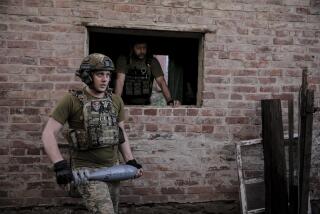This Tragedy Was Set in Moscow
- Share via
MOSCOW — The House Speaker’s Advisory Group on Russia did not bother to involve any Democratic members and has timed the release of its report to have the maximum negative impact on Vice President Al Gore’s presidential campaign. That’s a shame because the country very much needs to reexamine its Russia policy, and much of what the group, headed by Rep. Christopher Cox (R-Newport Beach), has to say would make an important contribution.
The main criticisms the report makes about U.S. policy under the Clinton-Gore administration--that diplomacy was over-personalized, bad news ignored or downplayed, a small group of Russian reformers relied upon too heavily, corruption taken too lightly and democracy subordinated to macroeconomic reform--are not so much wrong as overstated. Yes, mistakes were made in the effort to assist in Russia’s historic transformation, but the size and complexity of the task was so enormous that some mistakes were inevitable.
The bigger problem with the way the report conveys these facts is that it leads the reader to believe that the main actors in this drama sat in Washington rather than Moscow. It is the height of arrogance to proclaim that the Russians deserve little or no credit for what goes right in their country and bear little or no blame for what goes wrong, and that is the message of the Cox report. The only thing missing is a chapter blaming faulty Clinton-Gore policy for Russia’s underwhelming performance in the Sydney Olympics.
Unfortunately, the type of balanced statement that appears almost as a footnote to the report’s lengthy diatribe against the Clinton team--”It is quite correct that Russia is responsible for its own decisions and was never America’s to lose--or for that matter to win--[but] to the extent that U.S. policy made a difference in Russia, it made conditions worse, not better”--is eclipsed by ridiculous chapter titles like “1998: Years of Bad Advice Culminate in Russia’s Total Economic Collapse.” Indeed, the drafters of the report commit many of the same errors attributed to Clinton-Gore: The group ignores inconvenient facts, spins evidence to rally support for its partisan point of view, fails to integrate the views of other less partisan analysts and crafts a lawyerly but tendentious case against its main culprit, Gore.
Yet the problems in the Cox report go deeper. The main attack is launched at the point on which Clinton and Gore are less vulnerable: the U.S. transition assistance effort. Meanwhile, the most damaging policy decisions, concerning the international environment created around the fragile Russian state, are left almost untouched. In their zeal to demonstrate how the Clinton administration failed the Russian people, the group misunderstood how the administration, with a lot of help from the Russians, failed to manage U.S.-Russia relations. Clinton-Gore did far more damage with their decisions to enlarge NATO, revise the alliance’s strategic concept, bomb Serbia and Iraq and move to abrogate the Antiballistic Missile Treaty by developing a national missile defense than with their assist to corrupt Russian officials who systematically impoverished the Russian people and created a self-serving economic elite.
The Cox report argues that the Clinton-Gore team’s flawed efforts at the level of Russian domestic politics so poisoned the Russian population’s sentiments toward the U.S. that cooperation on worthwhile international projects like NATO enlargement, NMD and intervention in the Balkans became impossible. But the connection between the domestic and international initiatives was far blurrier than acknowledged, and the causal arrows probably pointed in the other direction. The report turns repeatedly to public opinion data showing that NATO enlargement and NMD had no real resonance among the general Russian population, whereas bad policy advice on privatization of state assets hurt the image of the U.S. more directly.
This reflects a failure to understand how policy is made in Russia. The Russian people still are treated as subjects rather than citizens, and their views didn’t count for much in Boris N. Yeltsin’s Russia. This goes back too many centuries to pin it on Clinton and Gore. The foreign policy and strategic elites mattered far more in the policymaking process, and their revulsion at NATO enlargement and Kosovo was unequivocal. Overall, elites in Moscow were more favorable toward the Clinton-Gore approach to assisting Russian reform (as the report makes clear, they profited enormously) than the population that suffered the consequences. The Cox report is right to worry about the consequences of a long-term decline in U.S.-Russian relations, but it is wrong in the conclusions it draws about what caused that policy failure. Shifting the emphasis exclusively to American complicity in Russia’s distorted transition from communism will not improve U.S.-Russia relations.
More to Read
Get the L.A. Times Politics newsletter
Deeply reported insights into legislation, politics and policy from Sacramento, Washington and beyond. In your inbox twice per week.
You may occasionally receive promotional content from the Los Angeles Times.








